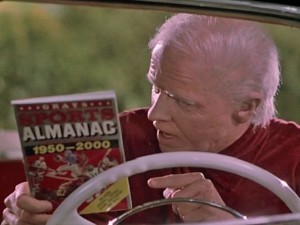Speaking at a conference in Los Angeles last week, I got acquainted with Howard Hyde, editor of the CitizenEcon.com website. He is also a prolific and gifted writer, author of the entertaining book, “Escape from Berkeley,” chronicling his philosophical transformation after growing up in radical leftist Berkeley, California in the 1960s and 70s.
Among Hyde’s many columns is an insightful satire called “Back to the Future and the Solution to Climate Change.” He makes a unique point about the concept of “settled science” that very few of us have considered.
 The idea begins with a concept from the 1980’s classic “Back to the Future” movies. Fans remember that the plot of the second film hinged on the antagonist (Biff) stealing a sports almanac during a trip to the future, then going back to the past and using sports scores from the book to make a fortune gambling. He becomes the richest man in the world because he isn’t really gambling at all – he already knows for certain the outcome of every game.
The idea begins with a concept from the 1980’s classic “Back to the Future” movies. Fans remember that the plot of the second film hinged on the antagonist (Biff) stealing a sports almanac during a trip to the future, then going back to the past and using sports scores from the book to make a fortune gambling. He becomes the richest man in the world because he isn’t really gambling at all – he already knows for certain the outcome of every game.
The comparison from the movie plot to the modern climate change debate is fascinating. Advocates of the man-made catastrophic global warming theory are essentially claiming, like Biff, that they absolutely know what will happen in the future. As Hyde explains, they know – with unquestionable certainty – what will happen to the climate in the next year, the next decade, and the next century. “They know where the seas are rising and where the ice is melting. They know where the droughts and floods will be, what species are going extinct and where the forests are dying. They even know where bumper crops will thrive and where forests will grow…”
Here is the new and unique point about this debate: solving a problem where there is absolute certainty about the cause and the solution does not require convincing anyone that you are right; it only requires that you ARE right. So why all the lobbying, conferences, press events, annual reports, and endless studies, all designed to raise awareness and convince policy-makers of the problem? If the science is completely settled and further research is pointless, why don’t these scientists and activists just use the information to make their fortunes, like Biff in the movie?
Successful entrepreneurs identify problems and provide solutions, paying the costs, taking the risks, and reaping the rewards. Think about the economic potential for someone with superior knowledge of the future. They could get very rich, betting on that future. It would be perfectly ethical and legal for such investors to buy lands that are now undervalued and sell lands that are now overvalued. They would sell expensive beachfront properties in Florida and other places where the sea is certain to rise, for example, and buy higher ground further from the beach, which is now far less valuable. Hyde points out how clever investors would leverage their winnings by shorting the overvalued, and borrowing cheap to buy the undervalued. They would invest in commodities from places where they will be abundant, and reap high prices caused by shortages elsewhere. The potential profits are enormous, if you really have the almanac.
There is a bit of sarcasm here, of course, but the point is about people who so adamantly claim the science is settled. The computer models cannot be wrong, and any skeptic is immediately branded as a science denier. The phrase “settled science” is actually offensive to science, the study of which never ends. In fact, computer models missed what actually happened to global temperatures over the past two decades, because they cannot predict all the variables that affect weather. Note that activists stopped saying “global warming” a few years ago, in favor of the more neutral “climate change.” It was a subtle acknowledgment that they do not, in fact, have the future almanac.
Perhaps it is revealing that leading climate activists have not invested personally in the get-rich schemes that would be easy if they really knew the future of climate impacts on specific places. Hyde suggests that they should “put their own money (instead of ours) where their mouths are.”
Actually, satire aside, private investment really is a key indicator. Capitalism and the old-fashioned profit motive are more likely to solve environmental problems than any government regulations. Competition and the race for economic success are powerful incentives. Free enterprise has created unprecedented wealth in our generation, and it is that system which enables mankind to solve its greatest challenges, including climate issues. Even without a time machine or a future almanac.
A version of this column first appeared in the Grand Junction Daily Sentinel August 25, 2017.




Comments on this entry are closed.